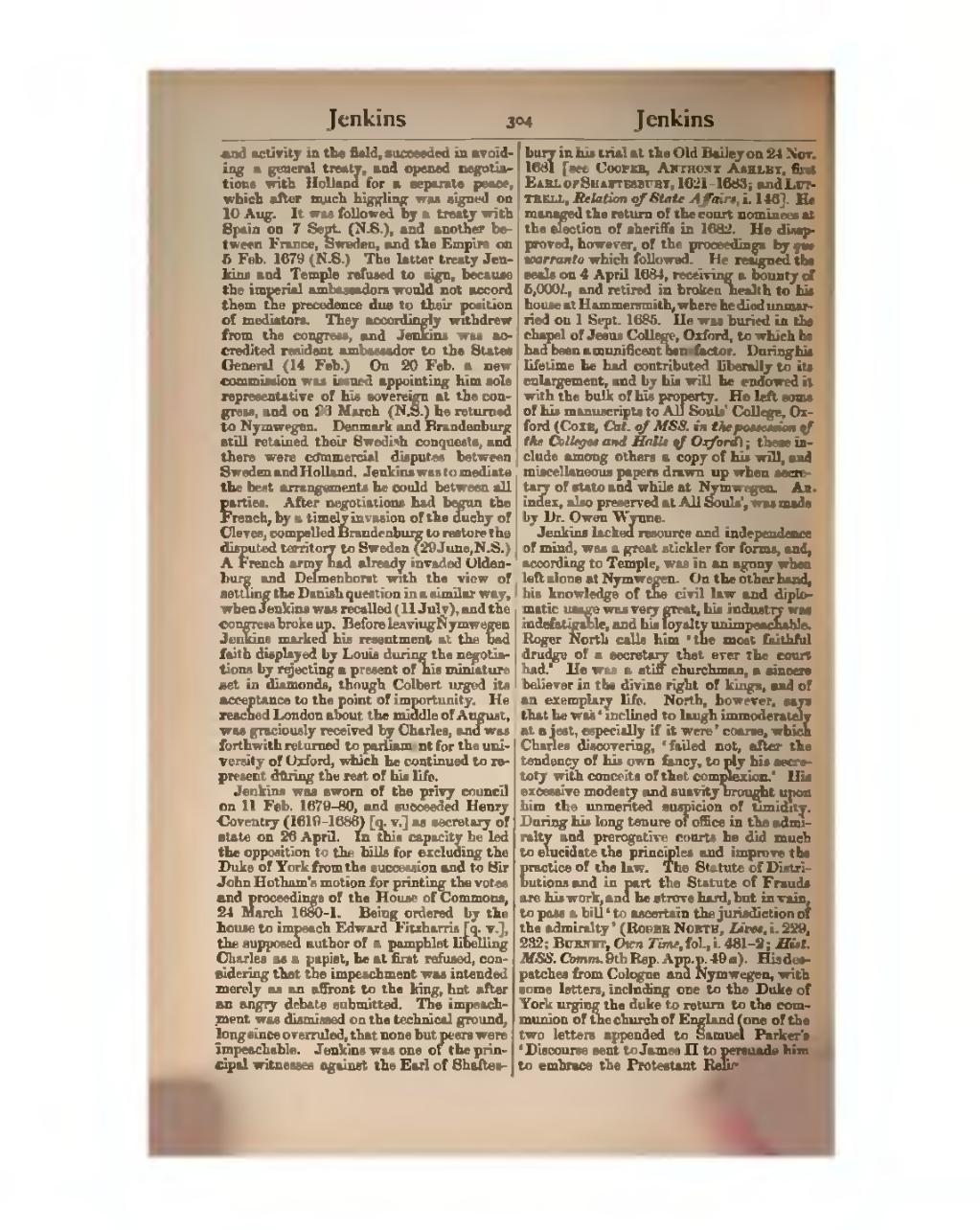and activity in the field, succeeded in avoiding a general treaty, and opened negotiations with Holland for a separate peace, which after much higgling was signed on 10 Aug. It was followed by a treaty with Spain on 7 Sept. (N.S.), and another between France, Sweden, and the Empire on 5 Feb. 1679 (N.S.). The latter treaty Jenkins and Temple refused to sign, because the imperial ambassadors would not accord them the precedence due to their position of mediators. They accordingly withdrew from the congress, and Jenkins was accredited resident ambassador to the States General (14 Feb.). On 20 Feb. a new commission was issued appointing him sole representative of his sovereign at the congress, and on 26 March (N.S.) he returned to Nymwegen. Denmark and Brandenburg still retained their Swedish conquests, and there were commercial disputes between Sweden and Holland. Jenkins was to mediate the best arrangements he could between all parties. After negotiations had begun the French, by a timely invasion of the duchy of Cleves, compelled Brandenburg to restore the disputed territory to Sweden (29 June, N.S.). A French army had already invaded Oldenburg and Delmenhorst with the view of settling the Danish question in a similar way, when Jenkins was recalled (11 July), and the congress broke up. Before leaving Nymwegen Jenkins marked his resentment at the bad faith displayed by Louis during the negotiations by rejecting a present of his miniature set in diamonds, though Colbert urged its acceptance to the point of importunity. He reached London about the middle of August, was graciously received by Charles, and was forthwith returned to parliament for the university of Oxford, which he continued to represent during the rest of his life.
Jenkins was sworn of the privy council on 11 Feb. 1679–80, and succeeded Henry Coventry (1619–1686) [q. v.] as secretary of state on 26 April. In this capacity he led the opposition to the bills for excluding the Duke of York from the succession and to Sir John Hotham's motion for printing the votes and proceedings of the House of Commons, 24 March 1680–1. Being ordered by the house to impeach Edward Fitzharris [q. v.], the supposed author of a pamphlet libelling Charles as a papist, he at first refused, considering that the impeachment was intended merely as an affront to the king, but after an angry debate submitted. The impeachment was dismissed on the technical ground, long since overruled, that none but peers were impeachable. Jenkins was one of the principal witnesses against the Earl of Shaftesbury in his trial at the Old Bailey on 24 Nov. 1681 [see Cooper, Anthony Ashley, first Earl of Shaftesbury, (1621–1683); and Luttrell, Relation of State Affairs, i. 146]. He managed the return of the court nominees at the election of sheriffs in 1682. He disapproved, however, of the proceedings by quo warranto which followed. He resigned the seals on 4 April 1684, receiving a bounty of 5,000l., and retired in broken health to his house at Hammersmith, where he died unmarried on 1 Sept. 1685. He was buried in the chapel of Jesus College, Oxford, to which he had been a munificent benefactor. During his lifetime he had contributed liberally to its enlargement, and by his will he endowed it with the bulk of his property. He left some of his manuscripts to All Souls' College, Oxford (Coxe, Cat. of MSS. in the possession of the Colleges and Halls of Oxford); these include among others a copy of his will, and miscellaneous papers drawn up when secretary of state and while at Nymwegen. An index, also preserved at All Souls', was made by Dr. Owen Wynne.
Jenkins lacked resource and independence of mind, was a great stickler for forms, and, according to Temple, was in an agony when left alone at Nymwegen. On the other hand, his knowledge of the civil law and diplomatic usage was very great, his industry was indefatigable, and his loyalty unimpeachable. Roger North calls him ‘the most faithful drudge of a secretary that ever the court had.’ He was a stiff churchman, a sincere believer in the divine right of kings, and of an exemplary life. North, however, says that he was ‘inclined to laugh immoderately at a jest, especially if it were’ coarse, which Charles discovering, ‘failed not, after the tendency of his own fancy, to ply his secretary with conceits of that complexion.’ His excessive modesty and suavity brought upon him the unmerited suspicion of timidity. During his long tenure of office in the admiralty and prerogative courts he did much to elucidate the principles and improve the practice of the law. The Statute of Distributions and in part the Statute of Frauds are his work, and he strove hard, but in vain, to pass a bill ‘to ascertain the jurisdiction of the admiralty’ (Roger North, Lives, i. 229, 232; Burnet, Own Time, fol., i. 481–2; Hist. MSS. Comm. 9th Rep. App. p. 49 a). His despatches from Cologne and Nymwegen, with some letters, including one to the Duke of York urging the duke to return to the communion of the church of England (one of the two letters appended to Samuel Parker's ‘Discourse sent to James II to persuade him to embrace the Protestant Religion,’ 1690,
